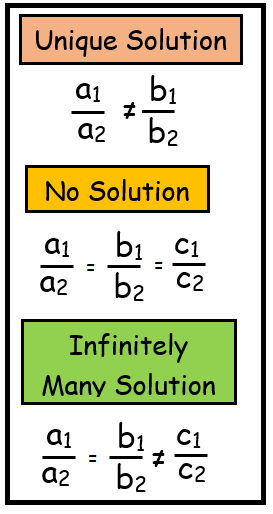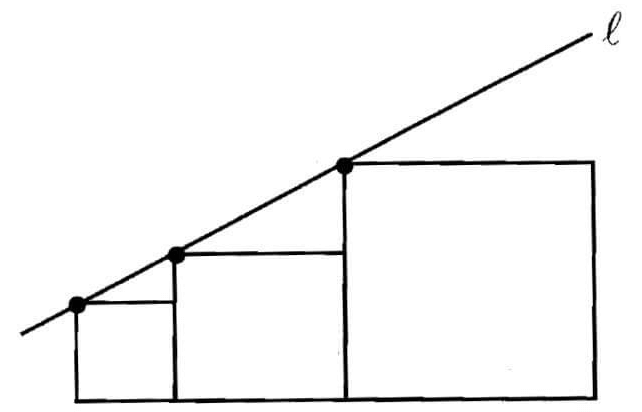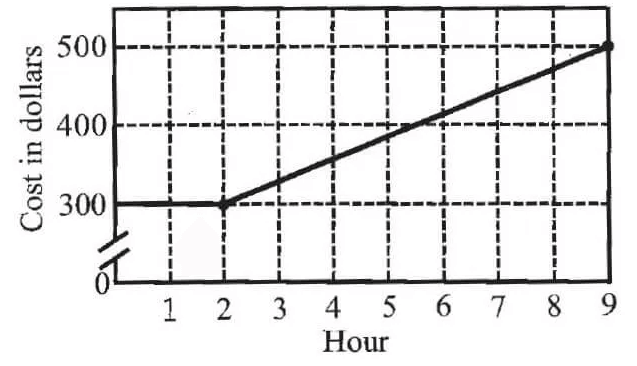SOLVING EQUATIONS WITH NO SOLUTION OR INFINITELY MANY SOLUTIONS
By comparing the coefficients of x, y and constants from the system of linear equations, we can say system of linear equations has unique solution, infinitely many solutions and no solution.
The system of linear equations which is in the form,
a1x + b1y + c1 = 0 and a2x + b2y + c2 = 0

If you obtain a false equation such as
0 = 1
in any of the steps then the system has no solution.
If you do not obtain a false solution, but obtain an identity, such as
0 = 0
then the system has infinitely many solutions.
Example 1 :
Use the method of substitution to try to solve the equations y = 3x + 1 and y = 3x + 4.
Solution :
y = 3x + 1 -----(1)
y = 3x + 4 -----(2)
Equation (1) and (2) are solved for y
By equating (1) and (2), we get
3x + 1 = 3x + 4
1 ≠ 4
So, the system has no solution.
Example 2 :
For what value of b will the system of equations below infinitely many solutions ?
-2x + y = 4 and 5x - by = -10
Solution :
Since the system has infinitely many solution, it has to satisfy the condition
a1/a2 = b1/b2 = c1/c2
-2/5 = 1/(-b) = 4/(-10)
-2/5 = -1/b = -2/5
-2/5 = -1/b
b = 5/2
So, the value of b is 5/2.
Example 3 :
ax - y = 0 and x - by = 1
In the system of equations above, a and b are constants and x and y area variables. If the system of equations above has no solution, what is the value of a ⋅ b ?
Solution :
Condition for no solution :
a1/a2 = b1/b2 ≠ c1/c2
a/1 = -1/(-b) ≠ 0/1
a/1 = 1/b
a ⋅ b = 1
Example 4 :
2x - (y/2) = 15 and ax - (y/3) = 10
In the system of equations above, a is a constant and x and y are variables. For what values of a will the system of equations have infinitely many solution?
Solution :
Condition for infinitely many solution :
a1/a2 = b1/b2 = c1/c2
2/a = (-1/2)/(-1/3) = 15/10
2/a = 3/2 = 3/2
2/a = 3/2
3a = 4
a 4/3
So, the value of a is 4/3.
Example 5 :
2x - ky = 14 and 5x - 2y = 5
In the system of equations above, k is a constant and x and y are variables. For what values of k will the system of equations have no solution?
Solution :
Condition for no solution :
a1/a2 = b1/b2 ≠ c1/c2
2/5 = -k/(-2) ≠ 14/5
2/5 = k/2 ≠ 14/5
2/5 = k/2
4/5 = k
So, the value of k is 4/5.
Kindly mail your feedback to v4formath@gmail.com
We always appreciate your feedback.
©All rights reserved. onlinemath4all.com
Recent Articles
-
Digital SAT Math Problems and Solutions (Part - 146)
Apr 18, 25 06:52 AM
Digital SAT Math Problems and Solutions (Part - 146) -
Logarithmic Derivative Problems and Solutions
Apr 16, 25 09:25 PM
Logarithmic Derivative Problems and Solutions -
Digital SAT Math Problems and Solutions (Part - 145)
Apr 16, 25 12:35 PM
Digital SAT Math Problems and Solutions (Part - 145)

